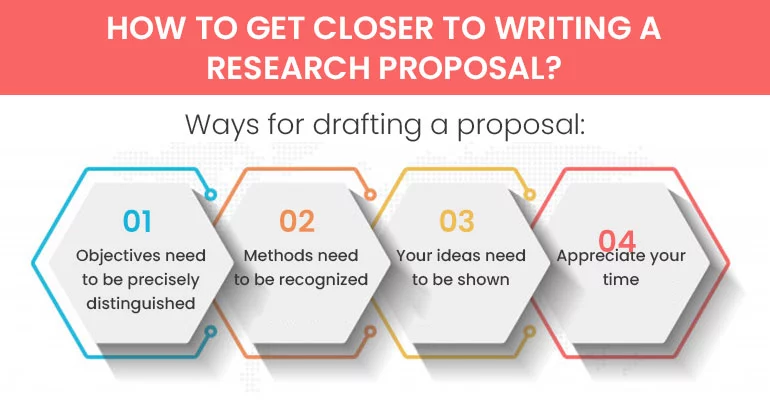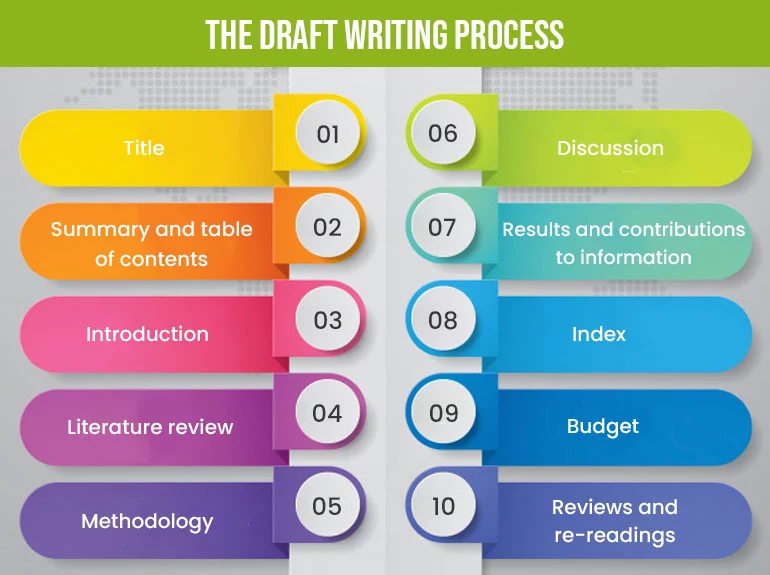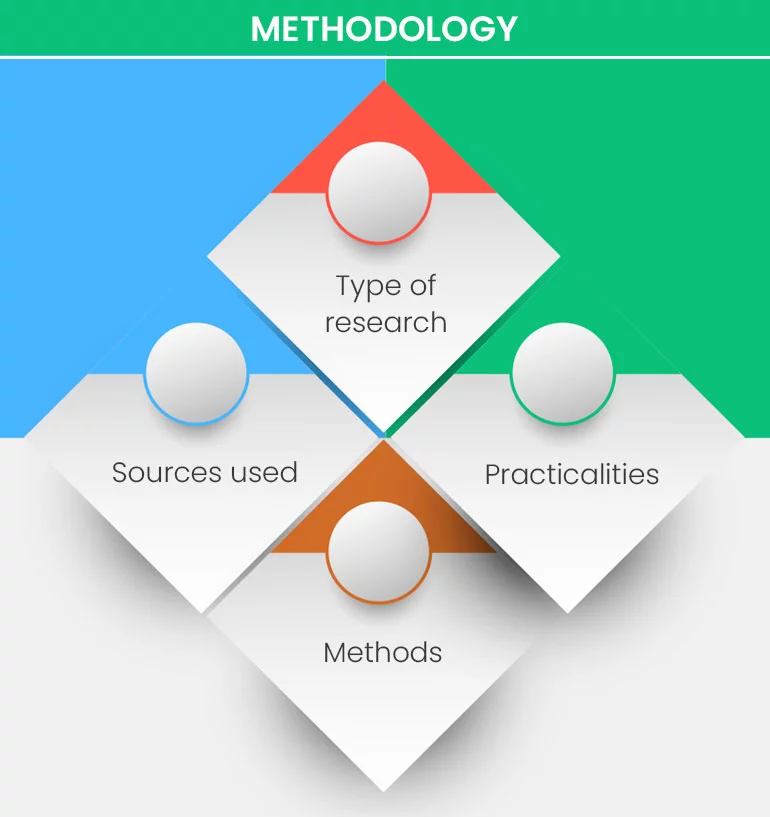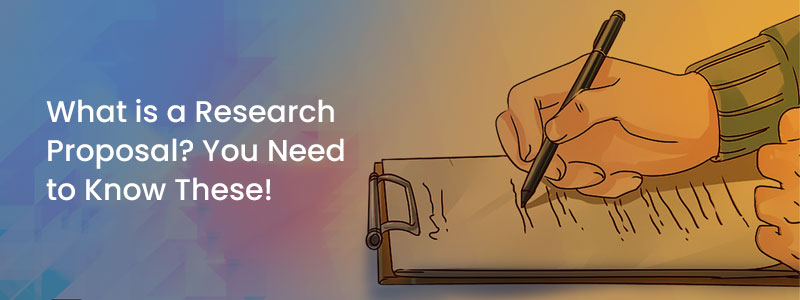Table of Contents
A research proposal is a document submitted by a student, researcher, or scientist to present their views on a specific topic that they wish to study or investigate through research papers. The main purpose of this write-up is to show and balance the need to review a particular problem or topic, outlining ways and means by which research can be kept on a topic or problem.
Since these papers hold so much importance, it is crucial that you prepare everything ahead of time by understanding the entire concept of research proposals.
How Can You Write a Research Proposal?
Well, most people are aware of research papers, but only a few of them know how to write a research proposal correctly.
Writing a research proposal might seem to be very simple, but in reality, it is not easy and is nothing similar to writing a general blog or an article. You need to mention and highlight the motives and essence of what your research paper includes, comprising of points that drive your readers to read your paper. Hence, students often start writing it once they complete their masters or while pursuing their Ph.D. in multiple subjects.
If you have been assigned the task of writing a research proposal recently, and you do not know how to start it, this is the right place where you can find everything about research proposals. It is essential to learn the professional way of writing a research proposal.
How to Get Closer to Writing a Research Proposal?

The research proposal is an introduction to your research. Look at it as a prelude to an upcoming novel. Such work may appear in your curriculum prior to many research projects – from thesis to timeline. It should include all the basics of your future research study. The data provided here is to allow the reader to evaluate whether your proposed research is relevant and helpful. Your instructor will deal with any obvious problems before spending a lot of time and energy on your final project.
Whatever your research topic is, there are some important ways to come up while drafting a proposal:
Objectives need to be precisely distinguished: You need to be clear about what you plan to achieve through the research.
Methods need to be recognized: Make sure you know the answer to how you will do the research and the tools you will use.
Your ideas need to be shown: Always keep in mind why you are interested in the research and what do you want to achieve with it.
Appreciate your time – so this guide goes through the process of systematic writing. Once you have talked about these basic steps, it is time to move on.
Proper planning with expertise execution
As said above, the sole purpose of a research project is to demonstrate the expertise of the topic that you choose to investigate, depending on the subject matter (understanding of the texts you will be discussing) and the structure. This is why it is challenging to stay on your path without a well-crafted topic.
There are customarily two ways to create a suitable topic. Some people choose to draft a topic in advance and research the content to suit the idea, opinion, or problem they are investigating. Others prefer to tailor their topic according to their ability or their preferred field.
It is evident why most people find that the best option to amalgamate a little of both ways. While you cannot write a proposal without a general understanding of where your research will lead, you will need to remain open to change and realize that your emerging understanding of the topic will probably change your suggestion over time.
Along with that, keep in mind that it is necessary to be brief when doing your research article. Verbosity and a more complex approach will confuse you as well as your audience, making it less engaging. It should be short and should indicate ideally what the problem is with the “table.”
Determine Your Prospects
Next, think about your audience. It will be easier to present a technical proposal if you consider your readers and the purpose of the proposal. In the end, you have to please the person who is already proficient in the field. Your weapons are your knowledge of the topic, the collection of information, and the research context.
It is also crucial to combine all the details you need into one logical write-up. For the most part, this will refer to the books and other published resources, without leaving out any author or researcher who can add some value to your writing. Your supervisor will be familiar with every aspect of the field, so if you ignore them in your index, the job will appear to be useless.
Now that you know the basics of writing a proposal, it is time to answer the big question: “How can you write a research paper proposal?”
Integrating the Research Proposal Structure: The draft writing process

Title
The audience-centric approach is what works well here. Try to make it as catchy and readable as you can. It should be creative, crisp, and to the point. Inside statements of the research and the topic should be interrelated. In most cases, the article will explain problems catering to the field you are writing about.
Your proposal needs to have a title page that includes:
- Your name
- Name of your manager
- Center and department
- The suggested topic for your project
You can also customize it according to your requirements.
Summary and table of contents
If your suggestion is too long, you may also need to include a table of contents to help the readers navigate the document whenever required.
Now, it is a research proposal. This part of the proposal outlines the research question, the basis for doing your job, the ideas you will want to prove or disprove, the steps you will take, and the results you hope to achieve. Make sure it is not more than 300 words in length.
Introduction
The first part of your proposal is the first voice of your project, so be sure to explain what you want to do and why precisely. Use the Introduction to describe the context in which your learning problem is located. This will assist your readers in knowing the topic and will shed light on why you have chosen to research this subject. The Introduction will give an insight into the details of your ideas. It should also briefly outline the important things you will investigate. You must:
- Introduce the topic
- Give the background and context
- Describe your problem statement and research questions/queries
Below are vital questions to include in the main topic:
- Who is interested in the topic (e.g., scientists, practitioners, policymakers, specific community members)?
- What is missing from current knowledge?
- What new information will your research offer?
- Why should this research be done?
Multiple sections can be utilized to produce in-depth detail-oriented data, including the ‘statement of the problem,’ ‘backend story & goal,’ ‘main objectives of the research,’ and its vitality.
Literature review
This reveals the first introductory context of the research paper. It is not uncommon for a reader to make a summary and begin to analyze a problem without referring to any textbook, not knowing that someone has already thoroughly investigated the problem. Prove your knowledge of the story by identifying the most influential writers in the field. Make sure you do not ignore or forget any of them.
How it works
- Propose alternatives to your expert as this will help your professor to assess how far (or deep) you have gone through your research.
- You need to carefully consider the many “stock” options within your discipline or field of study. After that, it is important to divide into those who will work directly on your research issue.
- Usually, methods meet certain problems within the topic, so it should not be too difficult to choose the ones that will suit you.
- It is recommendable that you illustrate your understanding by presenting alternatives and expected methods; this will confirm your commitment and professionalism.
Methodology

- Type of research
- Sources used
- Methods
- Practicalities
Discussion
The conversation is about the unique perspective of your research. Remember, this is an official document, but you need to show your enthusiasm for this project. Be sure to keep a balance between personal touch and study guidelines. If you want to guarantee that your writing will be well received, it is sometimes convenient to put on a few short vignettes in anticipation of some of the problems you see during your research.
Results and contributions to information
Undoubtedly, results play an important role. In the results section, describe the predicted results of the entire study. Of course, no one would expect you to know the results during the research promotion phase. As per the research done by you and based on your understanding, just quote an idea of future forecasting of what ideally an output can be.
These results are purely based on an assumption, so you definitely are not going to be judged as right or wrong. It will definitely vary according to different people’s perceptive and ways of doing the research. On the other hand, you should be able to guess what you hope to find, what data you want to collect and how you will use the data collected.
To complete your proposal on a solid note, you can look at the possible results of theoretical or practical research and re-emphasize what you intend to contribute to the information available on the topic. For example, your results may influence:
- Improving methods in a particular area or field
- Informing policy objectives.
- Strengthening theory or model.
- Popular or scientific challenge thinking.
- Laying the groundwork for further investigation.
Index
Your research proposal should include relevant quotes from all sources you have used, and full publication details should always be included in the index.
In some cases, you may be asked to enter a list of books. This is a list of sources you have used to in preparing the proposal. The purpose is to show the readers a complete list of books that will support your research project.
Budget
If you are applying for research funding, you will also need to submit a detailed budget showing how much each project will cost.
Make sure you check what kind of expenses the sponsoring body will agree to pay, and then include only the right items in your budget. For each item, enter:
Cost: How much do you really need?
Correction: Why is this needed to complete the study?
Source: How do you calculate money?
To determine your budget, consider the following:
- Travel expenses: Do you need to go to certain places to collect data? How will you get there, how much time will you spend there, and what will you do there (e.g., interviews, archive research)?
- Building materials: Do you need access to any tools or technology? Are there any training or installation costs?
- Help: Do you need to hire project research assistants? What task should be assigned to them?
- Time: Do you need to take a break from normal activities like teaching? How much money will you need to cover your research?
Reviews and re-readings
As with other subject writing courses, it is necessary to rearrange, edit, and re-evaluate your research application before submitting it. If possible, ask a supervisor or co-worker for an answer.
In order to have a good chance of being approved, you may want to consider using an experimental learning service to remove language errors, check your suggestion structure, and improve your educational style.
Tip:
- Do not use too many quotes.
- You need to show your understanding of the concepts other researchers have written, not to present your opinion!
- Repeating quotes to fill in the blanks is not the solution to the content deficit.
Checklist for research proposals
Once you have submitted your research request, it is time to look back on your accomplishments. We have compiled a list of questions that you can use to assess whether your research application is fulfilling its purpose. When making your suggestion, ask the following questions:
- Did you include any landmarks?
- Is the research question complete? Can you integrate it fully in the context of the study?
- Did you define the frames of the boundaries of your research?
- Have you developed a consistent and convincing argument?
- Did you carefully follow your research priorities? Didn’t you focus too much on the second detail?
- Does your suggestion follow a clear, logical sequence?
Once your paper has undergone this “pressure test,” it is time to read it and make your final editing. In this section, go through the paper well to highlight and correct all possible errors.
Things to consider while writing a research proposal
- If you are unsure of the design of the research proposal, try to prepare a plan on paper in advance, and doing this two or three times will help you improve your design. Also, this will allow you to eliminate errors and gaps in the original concept.
- Stay focused on the research problem. Students often experience stress when writing research proposals because they are not sure how to do it. Do not lose your focus, and do not think that many insignificant data will lead to the promotion of technical research.
- Seek help from a colleague or a friend to check your proposal when you are done. It is said that all researchers think they are intellectuals, but a quick look at some of the poorly written proposals will expose the flaws of this statement. A second opinion can give you some important feedback before you introduce it. Ask a colleague to go through all the areas closely so that you know the problems. Be prepared to accept any criticism.
- Use correct grammar and spelling. Even if your research ideas are well defined, your work will be well received if the use of your language is not acceptable. If you do not know how to check your grammar or spelling, use the grammar check software, which is available on the web.
- Do not make the task too short or too long. Extremely short texts will not look professional, and a longer suggestion may give your boss a sense of pride.
The bottom line –
A research proposal aims to present and justify the need to study a research problem. So, your research proposal should contain all the important elements involved in composing a research study, with enough information that enables readers to assess the usefulness of your proposed research. Finally, an effective research proposal is always evaluated on the quality of your writing and, therefore, it is important that your proposal is fair and compelling.



